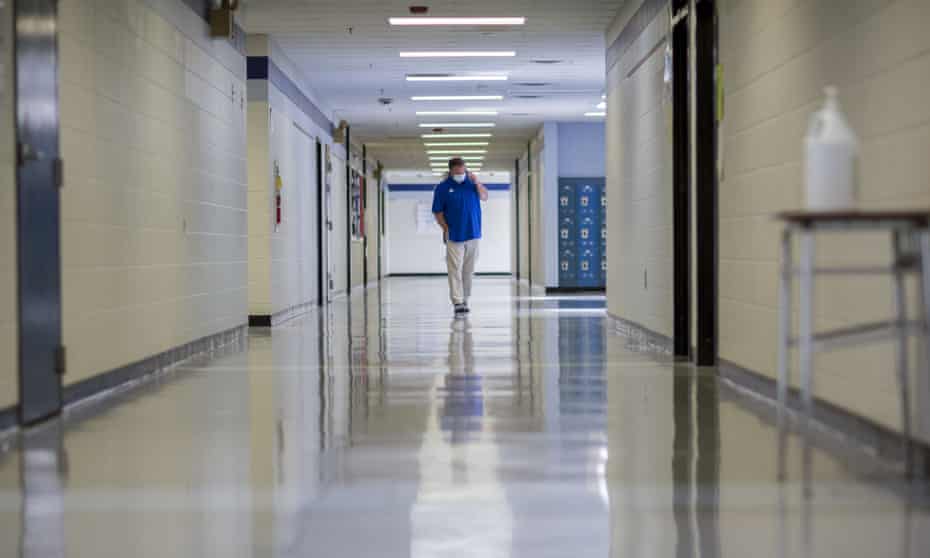Authorities change guidelines based on ‘what we know about the spread’ and protection from vaccination, as expert warns US ‘being hit by a viral hurricane’

US health authorities have halved, to five days, the recommended isolation time for people with asymptomatic Covid.
The US is facing a huge surge in Covid cases, driven by the Omicron variant, which contributed to travel chaos over Christmas and stoked worries about damage to the economy and education.
One expert told the New York Times: “All 50 states are in the soup at the same time. It’s like every state is being hit by a viral hurricane.”
But in a statement on Monday, Rochelle Walensky, director of the federal Centers for Disease Control and Prevention, said the new recommendations “balance what we know about the spread of the virus and the protection provided by vaccination and booster doses”.
The CDC said that after isolation, asymptomatic people should wear a mask around others for another five days.
It also recommended a five-day quarantine for those exposed while unvaccinated, more than six months out from their second dose or more than two months out from a single-dose Johnson & Johnson shot and not yet boosted.
“These updates ensure people can safely continue their daily lives,” Walensky said.
The move proved controversial. Michael Mina, an epidemiologist, called the new recommendation “reckless”.
“Some people stay infectious three days, some 12. I absolutely don’t want to sit next to someone who turned positive five days ago and hasn’t tested negative. Test negative to leave isolation early is just smart.
“I am 100% for getting people to drop isolation early. Heck, I formally recommended it to CDC in May 2020 and published the recommendation in the Journal of Clinical Infectious Diseases in April 2020. But it was always with a negative test. What the heck are we doing here?”
Others pointed to the need to avoid significant disruption to daily life.
Ashish Jha, dean of the School of Public Health at Brown University, said: “You isolate for five days. Now you feel well (are asymptomatic). You still need to wear a mask for five more days. Do I prefer a negative antigen test on top? Sure. Have said as much. But this seems pretty reasonable.”
Earlier, Joe Biden’s chief medical adviser floated another controversial proposal: a vaccine mandate for domestic air travel.
Amid cancellations caused in part by Omicron, Anthony Fauci said a mandate might confer stronger protection on flights, for which federal regulations require all those aged two and older to wear a mask.
“When you make vaccination a requirement, that’s another incentive to get more people vaccinated,” Fauci told MSNBC. “If you want to do that with domestic flights, I think that’s something that seriously should be considered.”
Two officials told the Associated Press advisers had yet to make a recommendation, as a mandate could trigger logistical and legal concerns.
The US mandates that most foreign nationals traveling to the US be fully vaccinated. Citizens and permanent residents only need show proof of a negative test. Federal rules don’t require people traveling within the US to do so. Hawaii requires a test or proof of vaccination.
At the White House, Biden told reporters the subject was discussed with governors.
“They asked Dr Fauci about everything from whether or not he thought he was going to move to test at home – I mean, on air flights and that kind of thing,” Biden said.
Biden pledged full federal support to states facing Omicron and a run on tests.
“My message is: If you need something, say something, and we’re going to have your back any way we can,” Biden said.
“Seeing how tough it was for some folks to get a test this weekend shows that we have more work to do,” he said, referencing his plan to make 500m rapid tests available beginning next month through a yet-to-be-developed website.
The Arkansas governor, Asa Hutchinson, raised concerns Biden’s plan could get in the way of state efforts. Biden said the federal effort would not interfere. A White House official said new tests would come from new manufacturing capacity.
Earlier this year, the White House explored a domestic vaccination requirement for flights, or requiring vaccination or a negative test. Officials expected legal challenges.
The CDC says more than 241 million Americans, about 77% of the eligible population aged five and over, have received at least one shot. The administration has instituted requirements that federal workers, contractors and those in healthcare get shots, and that companies with 100 or more employees have vaccination or testing mandates.
Those moves have been mired in legal wrangling. The supreme court is set to hear arguments on 7 January.
Such legal moves are likely to play out amid more distressing scenes nationwide.
Michael Osterholm, director of the Center for Infectious Disease Research and Policy at the University of Minnesota, told the Times the national character of the Omicron surge meant resources would be stretched and healthcare workers hit hard.
“We’re already stretched so thin,” he said.

Leave A Comment